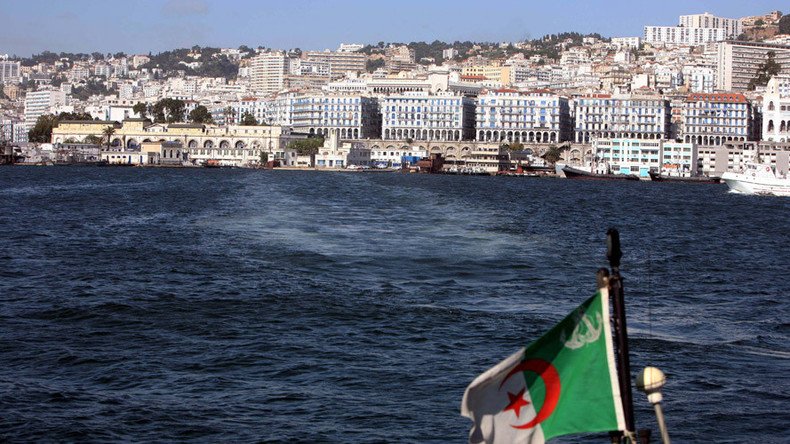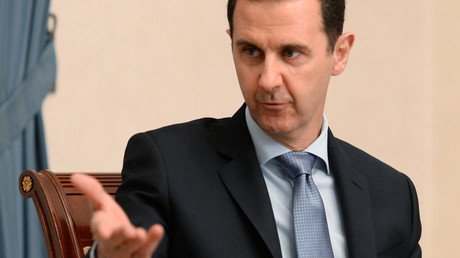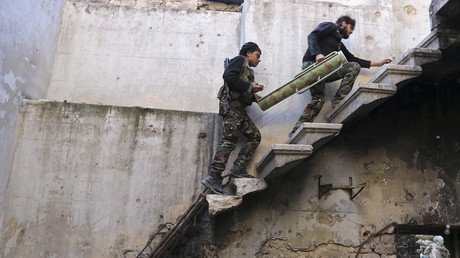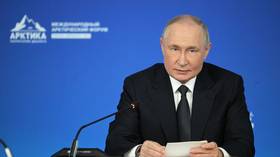How Algeria (yes, Algeria!) could hold key to Syrian peace

In April of this year, reports emerged in the Algerian media that intense diplomatic efforts were being deployed by Algiers to diffuse ongoing tensions between Syria and Turkey.
While at the time a thawing of relations seemed unthinkable, events in recent weeks indicate that those efforts have yielded results and Ankara's uncompromising position, in relation to Assad remaining in power, has somewhat softened.
No doubt re-enforced by Erdogan's own fragile position since he was almost ousted in a military coup in July, Turkey is realizing that both its stand-off with Russia and Syria have plunged it into an ever-deepening crisis from which its struggling to extract itself.
No sooner had it interfered in the internal affairs of Syria, Turkey's Kurdish separatists returned to the political frontline to push for independence from Ankara. What Turkey had long resisted seemed somewhat hypocritical in light of its desire to see segments of Syrian society break away from Damascus' rule.
Algerian mediation has therefore come at an interesting time and could secure a return to some tangible stability for all parties.
Algiers to the rescue?
Algeria has been consistent in its position since the outbreak of the Syrian crisis in 2011, insisting that Syrian sovereignty should be respected. For example, it fiercely opposed moves by the Arab League to expel Syria, one of its founding members, from the pan-Arab organization.
Any outside meddling in Syria, Algiers has argued, could only exacerbate tensions and risk engulfing much of the region into decades-long sectarian strife. Algiers has sided with Damascus, much as it did with Libya in those early days of the 'Arab Spring'.
Algiers is approaching the Syrian conflict from a prime position, in that its social fabric shelters it from usual accusations of tribal, religious or sectarian affinities with the Assad leadership.
As an essentially Sunni Muslim nation, Algeria cannot be accused of standing by Damascus over Alawite or Shia solidarity (An accusation often leveled at Iran despite its Mutual Self-Defence Pact signed with Syria in 2005 on the back of George Bush's infamous 'Axis of evil' speech in which he identified Iran, and to a lesser extent, Syria, as threats and therefore candidates for 'regime change').
Algeria also enjoys good relations with most Arab League nations and has consistently played a moderator role during periods of crisis in the region - whether among Arab nations or with other Middle Eastern countries.
And how many recall that it was Algiers that negotiated the release of US hostages held in Tehran after the revolution in 1979?
In 1988, Algiers found itself once again the main negotiator during the hostage crisis of Kuwait Airways Flight 422, when Lebanese fighters attempted to divert a plane traveling to Bangkok.
Algerian authorities refused to hand over the hijackers to Western capitals that were demanding their transfer to European courts to face trial.
More recently, Algiers refused to get embroiled in the current war waged by Saudi Arabia against Yemen, preferring instead to conduct behind-the-scenes talks that could resolve the ongoing crisis.
Having refused to engage in sectarian or tribal discourse that has pitted many Arab nations against each other, and preferring instead to support countries in the name of Arab solidarity, Algeria has acquired a reputation as a skilled and fair-minded party that has been credited for the resolution of many previous crisis.
Syria: Algeria's mirror image
Algiers' support for Syria, however, goes deeper than mere respect for national sovereignty. In the 1990's Algeria faced a similar crisis that Syria faces today when it was plunged into a decade-long civil war against 'Islamist' factions.
As the country embraced political change and allowed a plethora of new political parties to emerge in 1989, the 'Islamist' party FIS (Front Islamic du Salut) lead by the charismatic Abassi Madani appeared to be the most credible movement to challenge the ruling FLN's dominance in Algerian politics.
In a first round of elections, FIS won a majority of local councils forecasting an imminent victory at the next electoral round.
During that time, the FIS deputy and far more radical figure Ali Belhadj spoke of the need to cancel elections once in power and dissolve all state institutions that would allow his party to rule.
Such a convoluted and dishonest approach to politics was not lost on many in government.
Belhadj's fiery speeches were slowly but surely emerging as calls against those Algerians who did not support his 'religious' brand of politics and he was soon rallying support for attacks against state symbols in a bid to signal the potency of his movement.
The Algerian army eventually stepped in and cancelled the second round of elections that appeared to give FIS an almost guaranteed victory.
A move widely condemned by the 'international community,' it was immediately seen as a de facto declaration of war against FIS by its leadership.
Belhadj and Madani consequently called on their supporters to take up arms against the government and all those who opposed them dismissing them as 'disbelievers' plunging the country in a vicious internecine war that bears strong resemblance to the conflict ravaging Syria today.
For the army, the state institutions on which the Algerian nation had been built were being threatened by a group that was openly supported by foreign entities looking to establish a 'bastardised' version of an Islamic state on a country that was already Muslim and whose founding platform was steeped in Islamic values.
While there was merit in criticisms of the Algerian army's decision, FIS could and had the means to challenge the government's decision without resorting to violence. Instead the 'Islamic' party called its followers to arm and attack government and civilian targets, causing untold loss of exclusively Muslim life.
Young army reservists were being captured and beheaded by the newly formed AIS (Armée Islamic du Salut ) or GIA (Group Islamic Armé) and bombs placed in various institutions including schools and hospitals.
In August 1992, at the height of the summer holidays, a bomb went off in Algiers airport killing scores of passengers and maiming hundreds of others. The government declared a state of emergency and the country descended into its long painful civil strife that would leave as many as 200,000 dead and over 1m Algerians leaving the country over the following decade.
The country would spend the 90's, known locally as the black decade, isolated from the rest of the world as country after country, including close allies, would impose strict visa regimes for Algerian nationals. Business and travel to the North African state almost come to a halt.
Yet while Algeria's isolation was at the time felt like a painful betrayal, in the end it proved to be its salvation.
Left to its own devises, Algeria was able to resolve the crisis 'in-house' with no interference from outside forces. What has made the Syrian crisis intractable however is precisely the presence of foreign fighters traveling from across the globe to contribute to the removal of the 'Assad regime.' But what made domestic protests for more political transparency into an 'Islamic cause ' in which Muslims from across the globe would be invited to fight a holy 'Jihad'?
Syria's original protests were about fighting cronyism and supporting 'political pluralism', how did these notions turn into a desire to install an Islamic state in what is yet again a predominantly Muslim nation, where Islam is visible and present at every level of Syrian life?
No doubt it's Syria's geographical position, in the heart of the Levant, and bordering Western ally Israel, that has turned these localized protests into the global crisis it is today.
Today's Syria is viewed by many Algerians as the Algeria of the 90's.
Yet while regular attacks in Algeria were brutal leaving a nation scarred, war fatigue was beginning to wear terrorists down. Unlike Syria which appears to be supplied with fresh fighters regularly, GIA ranks in Algeria were eventually deflating.
Algerian support and know-how today is therefore crucial. As armed conflict was drawing to a close, Algerian president Abdelaziz Bouteflika, offered a full amnesty to those who took up arms against the state.
Plans have started for my family to leave Aleppo. كس اخت العالم.
— محمد ܡܚܡܕ ܐܠܚܠܒܝ (@syriani_) August 6, 2016
Put to a popular referendum and approved by a comfortable majority, fighters who were not involved in attacks against civilians or rape ( a common tactic by GIA terrorists) were pardoned and allowed to return to civilian life.
As is the case in Syria, many admitted to being drawn in a conflict they were unable to understand. With the Algerian government eager to restore peace as well as entrench a sentiment of national reconciliation, the war-torn country would eventually move forward.
Syria to Syrians
It is therefore imperative for outside forces involved in the Syrian conflict to withdraw. Turkey is now bogged down in problems of its own and Saudi, which devoted much of its military might to the war in Yemen, is looking for ways out while saving face.
This gives Syria an opportunity to take back control of the war and work towards a gradual return to peace. Recent images of Syrian opposition fighters surrendering to the Syrian army indicate that some form of amnesty based on the Algerian model will be offered to those Syrian opposition fighters. With most opinion polls pointing to Assad's popularity or to a rejection of the ongoing conflict, Syrians are faced with the opportunity to bring this crisis to an end. Sadly for Damascus there remains the thorny issue of what to do with scores of foreign fighters no one else wants and whose only option for survival is to continue to fight a government that was never theirs to challenge in the first place.
For that, Algeria has no past experience to share, however its mediating skills will now be crucial. For Syria's survival let's hope Algeria lives up to its reputation.
The statements, views and opinions expressed in this column are solely those of the author and do not necessarily represent those of RT.
















